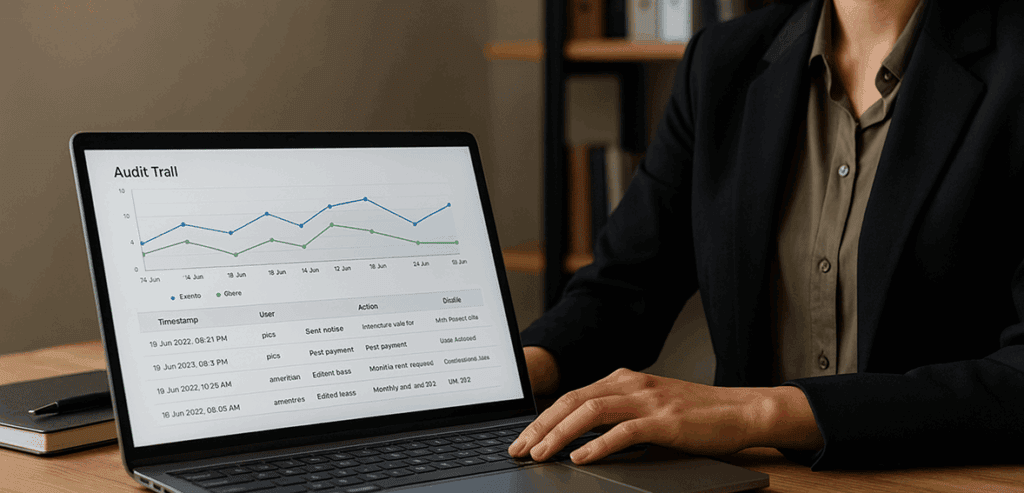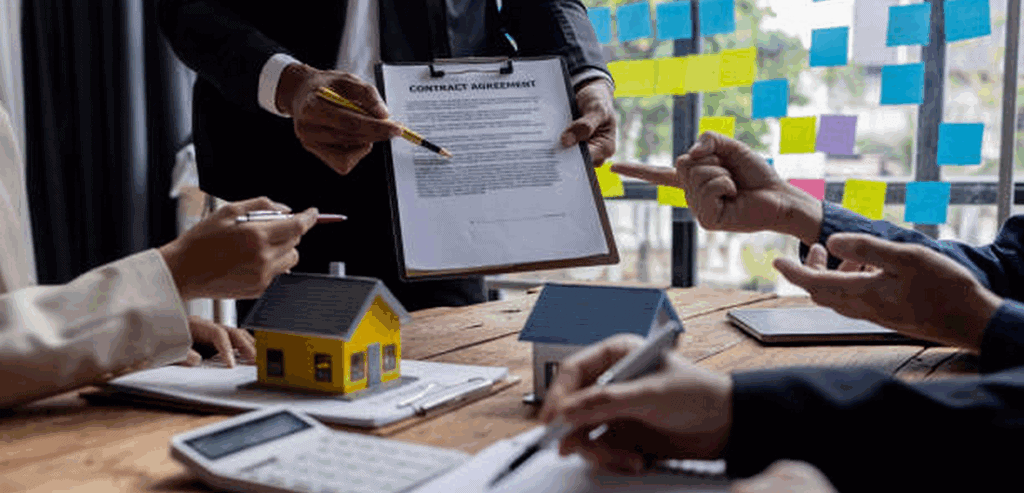
by Inez Kim August 7, 2025
Managing rental properties is about more than just collecting rent and fixing leaky faucets. Behind the scenes, property managers must juggle complex legal responsibilities, accounting requirements, and strict regulatory standards. Failing to meet these obligations can result in fines, lawsuits, and damaged reputations. That’s why using the right technology is becoming essential. Modern software solutions are transforming how landlords and property managers handle property management compliance.
With the right tools in place, managers can reduce legal risk, streamline operations, and stay confidently aligned with evolving regulations. From lease management to trust accounting and Fair Housing practices, software plays a critical role in helping teams operate responsibly and transparently.

Automated Record-Keeping and Audit Trails
Documentation is the foundation of legal protection in property management. Without clear records of leases, payments, notices, and communication, it becomes difficult to resolve disputes or demonstrate compliance during audits. This is where software-based record-keeping becomes indispensable.
Most modern property management platforms offer built-in logging of all key interactions. These include timestamped messages, digital copies of notices and inspections, payment histories, and maintenance logs. Having a digital audit trail ensures that every action is verifiable and accessible.
For instance, if a tenant claims they were not given proper notice before a rent increase or inspection, a timestamped message from the platform can provide proof. Similarly, if an accident occurs on the property, maintenance history reports can show what preventive steps were taken and when.
This level of precision greatly reduces human error, which is one of the most common causes of legal trouble in real estate. With automated logging and backup storage, managers gain peace of mind and a defensible position should any legal questions arise.
By embracing digital recordkeeping, teams can fulfill landlord legal requirements with less manual work and greater confidence.
Lease Compliance and Automated Alerts
Leases form the backbone of the landlord-tenant relationship. They must be accurate, compliant, and managed carefully. Property management software ensures that lease compliance is not left to chance by offering automated alerts and legally sound templates.
Critical dates like lease renewals, termination notices, and rent adjustments are tracked automatically. The system sends reminders when action is due, so managers do not miss deadlines or unintentionally breach lease terms. This is particularly important in rent-controlled or legally regulated markets, where even a few days’ delay could trigger penalties.
Software also provides customizable lease templates that are updated in line with local laws. These templates can include required disclosures, clauses, and formatting standards, helping maintain rental property law compliance without manual research.
By automating these processes, software reduces the risk of overlooked deadlines and outdated agreements. It ensures that leases remain aligned with current regulations and that all tenants receive consistent, compliant treatment. For growing portfolios, this becomes essential in maintaining a scalable, legally sound operation.

Fair Housing and Screening Compliance
One of the most critical areas of property management compliance is adherence to Fair Housing laws. Discrimination, even unintentional, can lead to costly lawsuits and public scrutiny. That’s why more managers are turning to software to standardize their screening and leasing procedures.
Many platforms now include built-in tools to support fair housing regulations property management. These features ensure all applicants go through the same process, with objective, consistent criteria applied to every file. When a tenant is rejected, the system prompts users to select from pre-approved reasons that are legally compliant, and records that decision in the tenant file.
Some software even flags potentially discriminatory language or decisions in notes and communications. This allows managers to catch issues before they escalate into violations.
In addition to legal protection, consistent, transparent screening improves tenant trust. When applicants see that they are evaluated based on business rules—not personal bias—it reinforces the professionalism of the landlord or management company.
Documenting these procedures is also helpful in defending decisions, should a rejected applicant raise concerns. Using software for screening ensures that data backs every decision, which is a key part of demonstrating compliance with fair housing regulations property management.
Trust Accounting and Financial Compliance
Handling money—especially other people’s money—comes with serious responsibilities. Property managers often manage client funds such as rent payments, security deposits, or maintenance reserves. These funds must be handled in accordance with strict accounting rules, often under trust accounting laws.
Property management software with dedicated trust accounting modules separates owner funds, tenant deposits, and operating capital. This structure prevents commingling of funds and provides clean records for audits and tax reporting.
Platforms also generate detailed financial reports, including owner statements, rent rolls, bank reconciliations, and expense breakdowns. These records help meet landlord legal requirements and simplify year-end accounting tasks.
Many systems also support features like automatic interest tracking on security deposits (as required in some states), and generation of IRS 1099 forms for owners and contractors. For property managers responsible for multiple clients, this level of automation ensures property management software accounting is both compliant and efficient.
Trust accounting is an area where mistakes can have major consequences. Software reduces the chances of human error and ensures clean books that hold up under financial scrutiny.

Maintenance and Safety Regulations
Complying with maintenance and safety laws is not just about tenant comfort—it is a legal responsibility. From elevator inspections to smoke detector testing, a wide range of regulations must be followed regularly. Software helps property managers schedule, track, and document these essential tasks.
For example, a platform might remind staff to check fire alarms every six months, service pools weekly, or conduct annual pest control. Once tasks are completed, the software logs them with timestamps and technician notes, creating a permanent record.
This documentation is key in proving rental property law compliance. If a tenant is injured due to a safety issue, having a clear record of prior maintenance can serve as legal defense.
Incident reporting tools can also be part of the system. If something goes wrong—like a slip-and-fall or broken lock—having a history of maintenance requests and response times helps establish that reasonable steps were taken.
Software systems that handle maintenance not only improve operational efficiency but also reduce legal exposure. By aligning maintenance schedules with safety regulations, managers can uphold their duty of care and minimize liability.
Staying Updated with Law Changes
Keeping track of every new law, ordinance, or court ruling can be overwhelming, especially when managing properties across multiple regions. Fortunately, many cloud-based property platforms now provide automatic updates, alerts, or guidance to keep users informed of changing regulations.
For example, if a state passes new rules around eviction notice periods, the software may update its lease templates or notify users with a summary of the change. Some platforms include legal content libraries or compliance dashboards, helping managers stay informed without having to search through government websites or legal bulletins.
This feature is especially valuable in times of rapid change, such as during public health emergencies or housing reform cycles. Timely alerts can help managers adapt lease terms, revise notices, or pause evictions in compliance with temporary moratoriums.
By outsourcing legal monitoring to the software, property managers can focus more on operations while trusting that they are aligned with current laws. It’s a powerful benefit that turns reactive compliance into proactive risk management.

Privacy and Data Security Compliance
With the rise of digital management tools comes a new responsibility: protecting tenant and owner data. Personal details like social security numbers, bank accounts, and application history are sensitive and must be handled in compliance with privacy laws such as the General Data Protection Regulation (GDPR) or state-specific rules like the California Consumer Privacy Act (CCPA).
Property management software helps maintain property management compliance in this area through built-in security features. These include encrypted data storage, secure tenant portals, role-based access controls, and audit logs of who accessed what information and when.
Secure platforms also help build tenant trust. When renters know their personal data is being stored and shared safely, they are more likely to engage with online portals and payment tools.
Complying with privacy regulations is more than a legal requirement—it’s a fundamental part of professional and ethical property management. Using software with strong security measures ensures managers are not only efficient but responsible with their digital tools.
Building Legal Confidence Through Software
For property managers, the landscape of rental property law compliance is only growing more complex. Laws change, responsibilities increase, and tenants are more informed about their rights than ever. The pressure to operate responsibly is real—but so is the opportunity to lead with confidence.
Software bridges the gap between legal complexity and everyday operations. Whether it’s ensuring timely notices, documenting maintenance, or producing audit-ready financials, platforms are turning compliance from a burden into a built-in feature.
Adopting these tools is not just about convenience. It’s about reducing risk, protecting your business, and delivering service that respects both the law and your clients. In a world where legal missteps can cost thousands, investing in technology is one of the smartest things a property manager can do.
Final Thoughts: Making Compliance a Core Competency
Legal compliance in property management is no longer something to handle reactively. It must be baked into every process—from leasing and accounting to maintenance and communications. With the right software, achieving this integration is not only possible but also practical.
Property management compliance software does more than organize documents. It safeguards legal standing, ensures financial accuracy, and promotes fair, transparent practices. It supports adherence to landlord legal requirements, simplifies property management software accounting, and enforces fair housing regulations property management without guesswork.
As legal environments continue to evolve, property managers who rely on modern platforms will be better prepared to adapt, avoid disputes, and demonstrate professionalism in every interaction.
In the end, good compliance is not just about avoiding problems. It’s about building trust, maintaining integrity, and running a property business that stands on solid ground—legally and ethically.
FAQs
How does property management software support legal compliance?
Property management software offers built-in tools for tracking leases, notices, payments, and maintenance with timestamped records. This creates a digital audit trail that helps prove compliance with safety, financial, and communication laws. Automated reminders and standardized processes reduce human error and help property managers stay aligned with legal timelines.
What are the benefits of using software for landlord legal requirements?
Software reduces the manual burden of staying compliant by automating lease tracking, accounting, document management, and safety scheduling. For example, digital lease templates can include required clauses and disclosures, while trust accounting features help separate client funds. These tools help avoid legal missteps and make compliance more scalable.
How does software help with fair housing regulations in property management?
Property management platforms standardize tenant screening with consistent criteria, helping ensure unbiased evaluations. Many systems include built-in checks or alerts that flag potentially discriminatory language or decisions. Data-driven documentation supports fair housing compliance by showing that decisions were based on business rules rather than personal bias.
Why is trust accounting important in property management?
Trust accounting ensures that tenant and owner funds are held separately and managed in compliance with financial laws. Software with trust accounting features automates bank reconciliations, tracks deposits and expenses, and provides detailed reports. This makes audits easier and helps avoid legal violations related to fund mismanagement.
How do software tools handle updates to rental property law?
Cloud-based software often updates lease templates, workflows, and alerts based on changes to local and federal rental laws. This ensures property managers are working with the most current compliance requirements without having to track every legal change manually. It reduces risk and saves significant time.